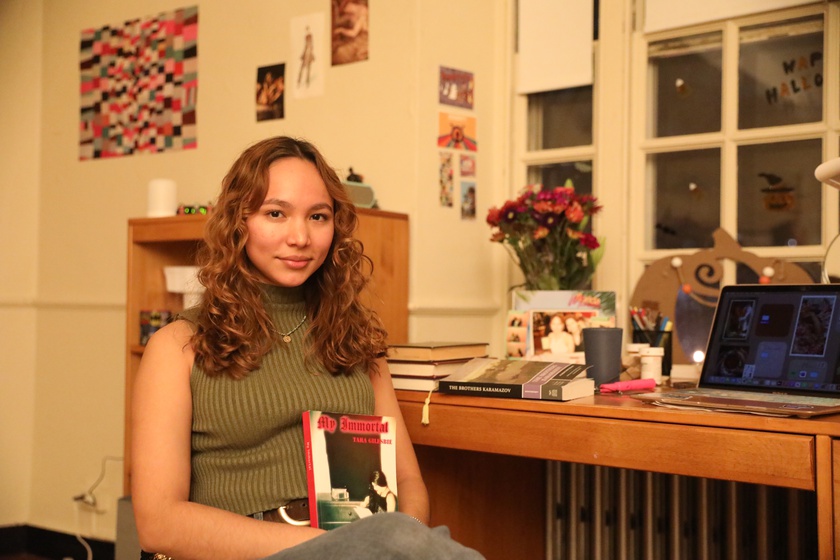{shortcode-8ea214897d99541168e8a7f1c17813da7a2ef6b0}
{shortcode-be29865d8a9c7908fa05930b7f2d42574eaa573c}f you asked freshman-year Tatiana Miranda ’24 whether she would imagine herself writing a thesis on Joker fanfiction, the answer would be, “Not in my wildest dreams, no!”
But fast-forward three years and Tatiana is doing exactly that. Her thesis explores how Joker fanfiction writers, particularly those who have marginalized identities, use their writing to reckon with their experiences.
Coming to Harvard as a woman of color, Tatiana recounts, she felt “trapped” in her body, and she would often receive comments about her appearance that she found strange. Throughout her academic career as a joint concentrator in English and Women, Gender, and Sexuality, Tatiana found herself engaged in conversations about mind-body dualism in literature — how the mind is typically associated with masculinity and Western culture, whereas the body is relegated to marginalized groups. These discussions planted the seed for her thesis.
“Fanfiction is marginalized in part because it’s very bodily writing. It’s usually written in first person or second person, and the action’s usually about the body,” she says. “My thesis, I ended up thinking, ‘Okay, let me connect fanfiction with another very bodily genre,’ which is the superhero genre, that’s all about super abled bodies. So ultimately, I chose the Joker because he doesn’t have superpowers — he just takes punches, he’s not attractive, and he’s kind of gross.”
Tatiana initially delved into the world of fanfiction when she was around 12 or 13 years old, long before she would start researching this topic for her thesis.
“That’s when I took an interest in writing on my own, and when I discovered that I can engage with stories that I already enjoy and already envision myself in,” she says.
From there, fanfiction became her means of “hyperfixating and procrastinating for many, many years,” Tatiana says. “And when I got to college, I was like, ‘You know what? I’ve loved this all my life. I kinda want to study it. So I’ve always sprinkled it in whenever I could.”
Aspects of Tatiana’s personal life also sparked her interest in studying the body and bodily forms of writing. Tatiana pole dances and has felt the stigma that surrounds the art when someone asks what her post-graduation plans are.
“It’s a totally viable option for me to go ahead and be a pole instructor. I already have a job in Miami,” she says. “But I feel like that’s a controversial thing to say. It always seems like you can either do smart people jobs that don’t involve your body, or dumb jobs where you’re just moving your body.”
These experiences, in combination with WGS classes about bodily care and Black feminist theory, inspired Tatiana to explore marginalization and the body in depth. When she decided to pursue a thesis, she began the process of putting the pieces together. First, she honed in on which movie and character would be her focus, then decided to study fanfictions involving relationships between the Joker and an original character — a new character made up by the writer — since such figures have more direct connections to the writer.
Next, she “read a ton of Joker scholarship,” she says, to get a better sense of what most people currently portray the Joker as: an outsider, someone who is “mad” and “evil.” His portrayal in “The Dark Knight” in particular is very physical, Tatiana explains; he is physically deformed, is assaulted frequently, and his experiences of marginality are apparent. This, she says, helped her draw connections to the fanfictions she picked, and how the writers’ experiences of marginality interacted with the Joker’s.
As it turns out, drawing these connections was no easy feat. “My ADHD brain was on, like, 18 different tracks,” she explains. She shows me her full workspace — what she and her roommate call “the crazy stuff” — which consists of printed, annotated fanfictions; more annotated PDFs; several documents of research, outlines, and drafts; and notebooks where she has repeatedly summarized and synthesized her ideas.
Throughout this process, Tatiana credits her advisers, Stephanie Burt ’94 and Ericka R. “Ricky” Sanchez, for helping her stay on track with her project and, most of all, for allowing her to pursue something she felt passionate about, no matter how unconventional the topic.
“I’m very grateful,” she says. “I definitely picked the departments and the teachers and the pathways that would be best for me. I didn’t want to be flamed or put down in any way, so I chose a good niche, and I’m very thankful.”
After these four years of college, especially with this intensive process of working on her thesis, Tatiana is “very exhausted.” As of now, she isn’t sure what her future plans are; a break seems to be in store. But one thing does remain clear.
“If I do end up pursuing further studies, my focus would be on fanfiction,” she says. “I like studying my own cultural moment.”
— Magazine Editor-at-Large Kaitlyn Tsai can be reached at kaitlyn.tsai@thecrimson.com. Follow her on Twitter @kaitlyntsaiii.


